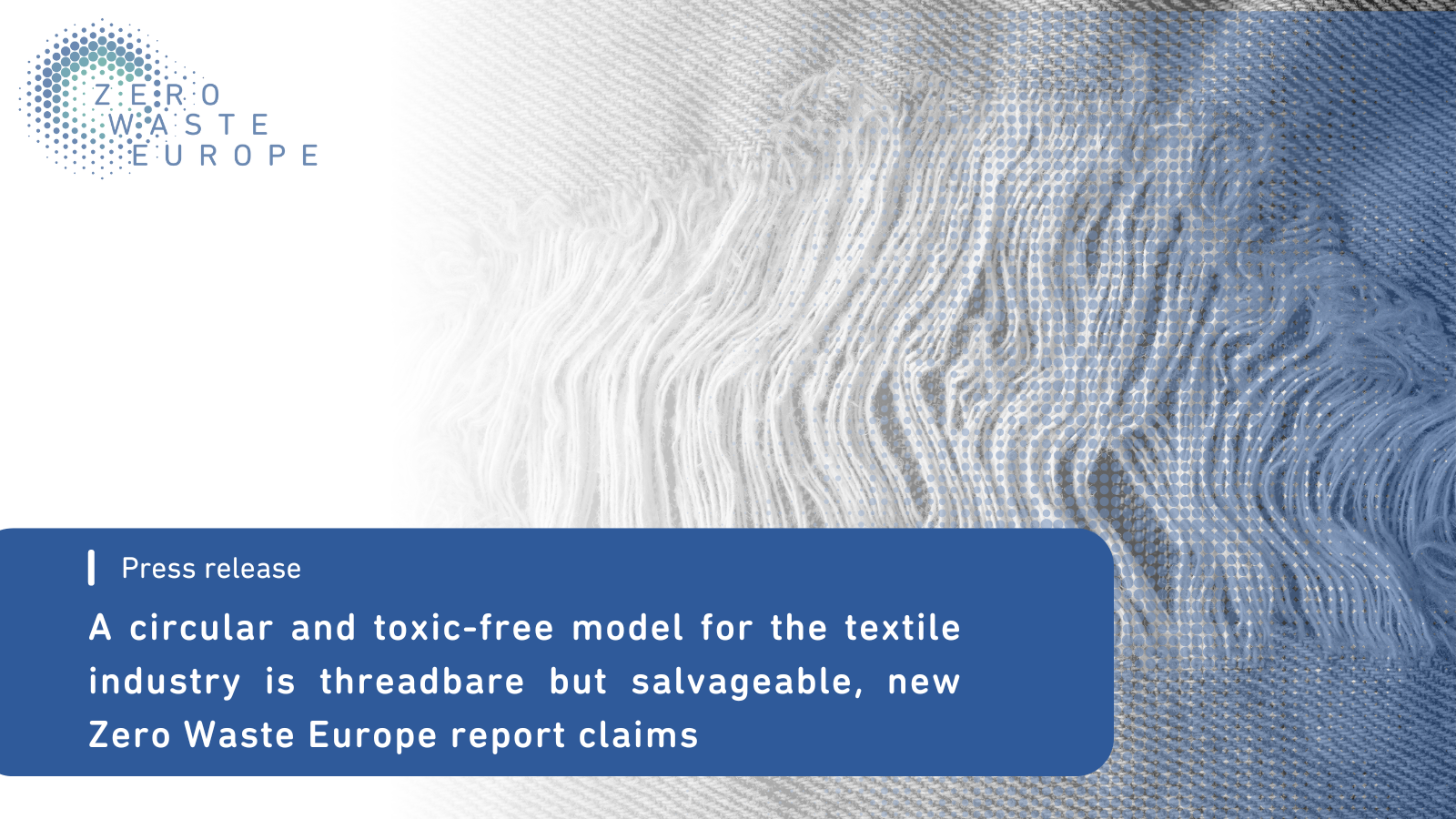A circular and toxic-free model for the textile industry is threadbare but salvageable, new Zero Waste Europe report claims

Brussels, 7 May 2024 – Zero Waste Europe’s latest paper asserts that the textile industry must reform its practices now or risk deteriorating further into an unsustainable and harmful business model.
The paper, entitled “A Zero Waste Vision for Textiles – Chapter 2: Circular and toxic-free material flows” assesses the current state of textile circularity in the EU and proposes a number of policy interventions.
Co-author Theresa Mörsen, Waste & Resources Policy Officer at Zero Waste Europe, states:
“The state of circularity in the textile sector is notably poor, and the latest projections for reuse and recycling in the sector are everything but promising. The overall growth in the sector will nullify any progress made on circular activities.”
The paper emphasises the urgent need to phase out hazardous chemicals and tackle the release of microplastics, both of which cause a significant amount of pollution and are barriers to achieving a toxic-free circular economy. Consumers can be exposed to hazardous chemicals in textiles – such as PFAS and heavy metals – through skin contact, inhalation or unintentional ingestion of dust released from the materials. Sadly, the most problematic chemicals can be found in textiles used by children and pregnant women, who are most vulnerable and may experience more adverse health effects.
“Unlike other products, we can’t avoid coming in contact with textiles every day of our lives. That’s why the safety of these products is vital. The presence of harmful chemicals in our clothes not only threatens public health but also makes recycling even harder — undermining the transition towards a circular system,” noted Dorota Napierska, contributor and Toxic-Free Circular Economy Policy Officer at Zero Waste Europe.
Recycling plays a crucial role too – but only once manufacturers ensure high-quality and durable products, while prioritising local reuse and upcycling. The paper outlines a vision where textile recycling is not just a niche activity but a cornerstone of the industry. ‘Downcycling’ is discouraged in the outlined best practices, meaning significant enhancements must be enacted in the preexisting infrastructure to allow high-quality fibres can be recycled.
“If the textile industry wants a cleaner image, changes must happen at the initial phases of production and during the development of the product to ensure that recycling is sustainable, safe, and enhances circularity. This means breaking up with the business-as-usual approach, and including recycled materials from textile waste. This report suggests concrete instruments for this much-needed makeover to respect both planetary boundaries and human health,” says Lauriane Veillard, contributor and Chemical Recycling & Plastic-to-Fuels Policy Officer at Zero Waste Europe.
This new chapter offers a suite of robust recommendations for policymakers. Extended Producer Responsibility (EPR) schemes are acknowledged as key drivers for the transition towards greater circularity as they can contribute to making reuse and recycling operations more economically viable.
“In view of the ongoing revision of the Waste Framework Directive, policymakers must seize the opportunity by ensuring that reuse and recycling are supported via legally binding targets in EPR systems. Apart from this, also the incoming ecodesign for textiles has the capacity to change the entire system. Well-designed legislation can benefit the health of citizens, improve reusability and boost recyclability of products,” co-author Theresa Mörsen stresses.
ENDS
Notes to the editor
- Link to “A Zero Waste Vision for Textiles – Chapter 2: Circular and toxic-free material flows”: https://zerowasteeurope.eu/library/a-zero-waste-vision-for-textiles-circular-and-toxic-free-material-flows/
- Link to “A Zero Waste Vision for Fashion – Chapter 1: All We Need Is Less”: https://zerowasteeurope.eu/library/a-zero-waste-vision-for-fashion-all-we-need-is-less/
- This paper serves as the second chapter in a two-part series exploring fashion and textiles along the entire value chain. The first chapter emphasises the need to curtail production and consumption, while the subsequent instalment will delve into circularity, covering optimal design, use, reuse, recycling, and end-of-life treatment of textiles.
Press contacts
Sean Flynn, Media Outreach & Communications Officer at Zero Waste Europe, [email protected] or [email protected] / +32 471 96 55 93
Theresa Mörsen, Waste & Resources Policy Officer at Zero Waste Europe, [email protected]
Dorota Napierska, Toxic-Free Circular Economy Policy Officer at Zero Waste Europe, [email protected]
Lauriane Veillard, Chemical Recycling & Plastic-to-Fuels Policy Officer at Zero Waste Europe, [email protected]
About Zero Waste Europe
Zero Waste Europe (ZWE) is the European network of communities, local leaders, experts, and change agents working towards a better use of resources and the elimination of waste in our society. We advocate for sustainable systems; for the redesign of our relationship with resources; and for a global shift towards environmental justice, accelerating a just transition towards zero waste for the benefit of people and the planet. www.zerowasteeurope.eu